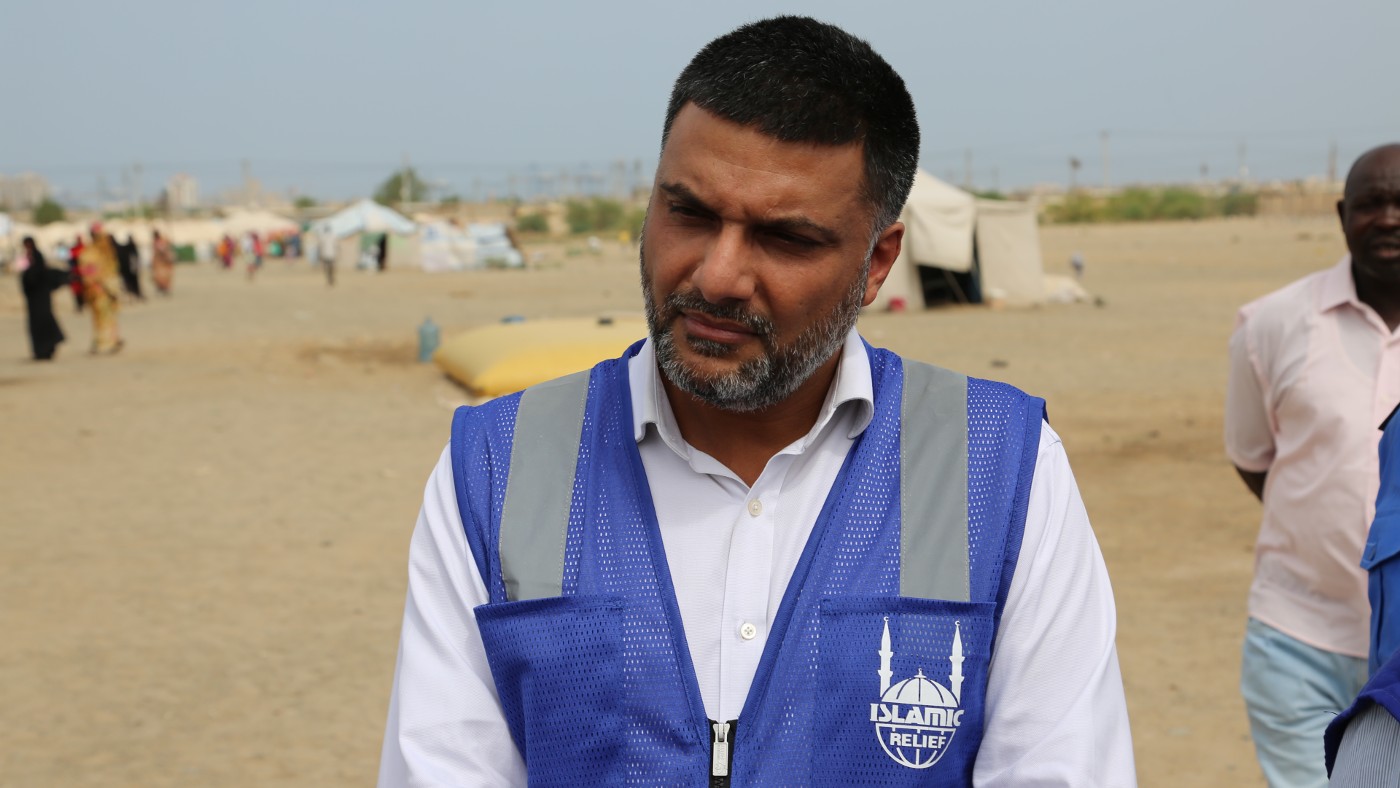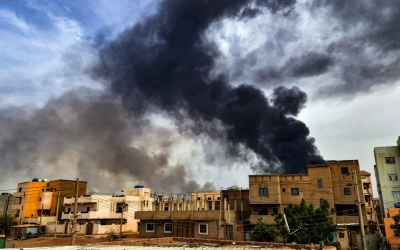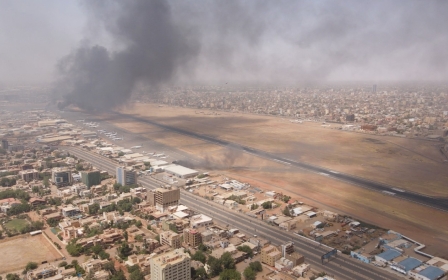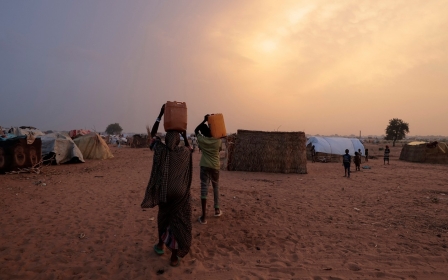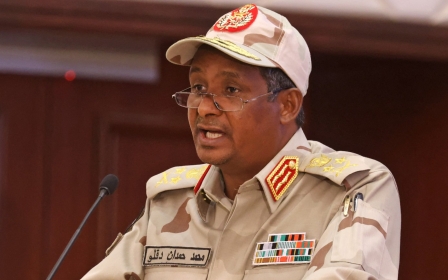In Sudan, humanitarian workers face unimagined horrors
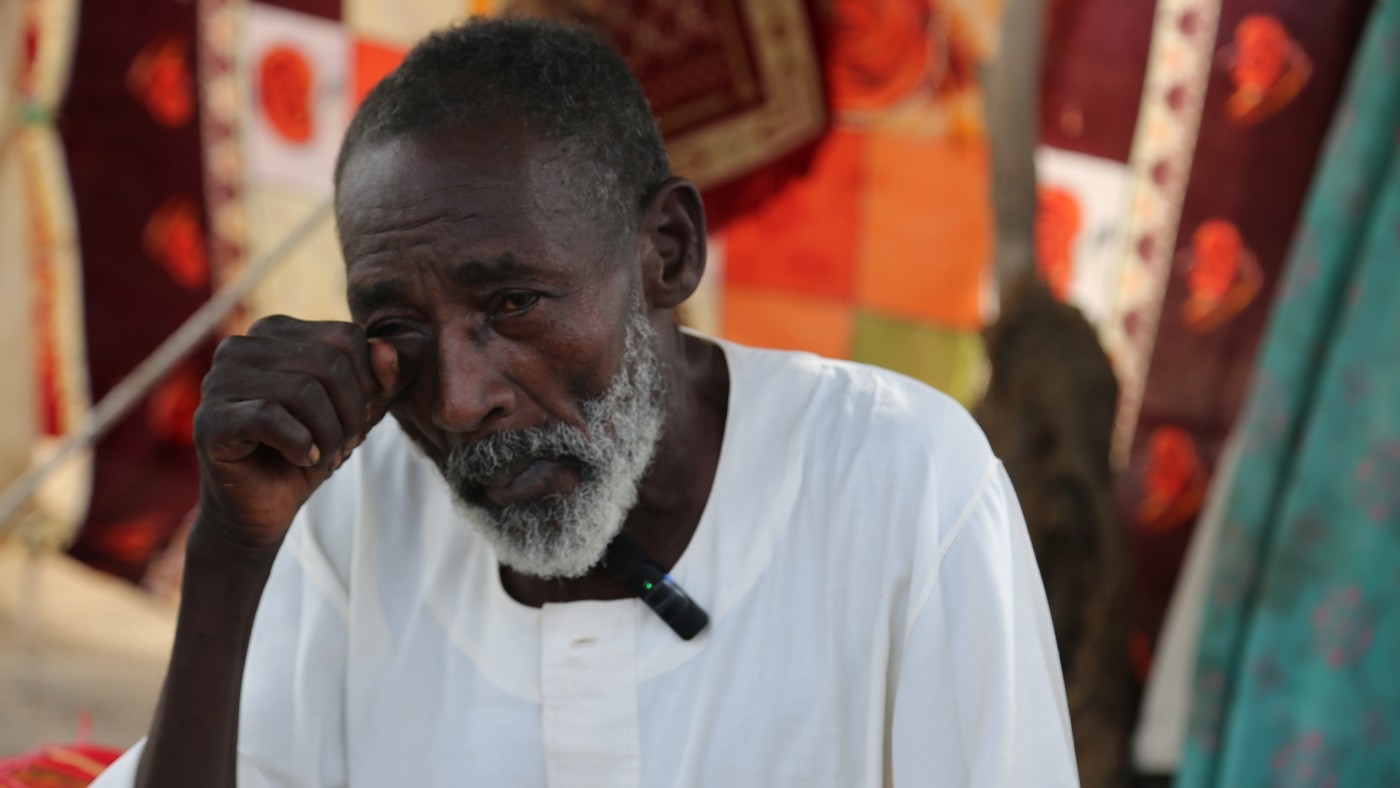
There were about 110 children at the camp in Port Sudan, all of whom had fled their homes because of the war.
Sitting amid makeshift shelters made from plastic sheets, the children spoke with members of the psychosocial team from the charity Islamic Relief and described what had happened to them. They drew pictures of men with guns, men killing people, houses burning and worlds ending.
One little boy, about six or seven years old, approached Waseem Ahmad, Islamic Relief’s CEO, and asked if he had any sweets. “I could tell he was malnourished,” Ahmad told Middle East Eye. “I asked him what he had been eating and he said he’d eaten whatever he could find on the way – grass and insects.”
Ahmad gave him two sweets. The boy told him he would save one for his sister and brought Ahmed to meet her and their mother. “She said she didn’t know where her husband was,” Ahmad recalled.
Fighting in her native Sinja, in Sudan's southeastern Sennar state, had forced the woman to flee with her children on foot. With daytime temperatures topping 40C and armed groups along on the roads, she led her children through bush, jungle and forest at night.
New MEE newsletter: Jerusalem Dispatch
Sign up to get the latest insights and analysis on Israel-Palestine, alongside Turkey Unpacked and other MEE newsletters
It took the family 12 days to get away from the fighting. Eventually, they made it to Port Sudan, the Red Sea city now hosting the country’s army-aligned government and hundreds of thousands of people displaced by the war that began in April 2023.
The mother shared with Ahmad how, during her 300km journey with her family, she would periodically hear the screams and cries of other women. The Rapid Support Forces (RSF), the paramilitary force that was once connected to the Sudanese army but now fighting against it, has been “ripping women and young girls away from their relatives”, Ahmad explained, recounting conversations he had with some of those women during his recent trip to Port Sudan.
In RSF-controlled areas, abductions and assaults often occur at roadblocks. To avoid this, the boy's mother steered her family away from vehicle-accessible paths. “People are using rape and violence as a weapon of war,” Ahmad said, referring to the RSF.
Thinking back to his initial encounter with the boy, Ahmad said: “Such an innocent young boy, asking me if I have sweets. At this age, how is that possible?”
War in Sudan
The humanitarian, who has worked in this field for 24 years, returned to this theme during an interview with MEE a day after he returned from a week-long trip to Sudan. Islamic Relief is currently operating in Port Sudan, Gedaref, Central Darfur, West Kordofan, and North Kordofan.
The war, now 18 months old, has forced nearly three million Sudanese to leave the country, while the International Organization for Migration (IOM) reports that almost 11 million people have been internally displaced.
'What I saw in the eyes of women who went through sexual violence, who had their children killed in front of them... This is not something you want in this century'
- Waseem Ahmad, Islamic Relief CEO
No official or reliable statistics are available for the number of people killed in the ongoing conflict, which began in the capital Khartoum, spread to Darfur, and extended into other states. Ahmad says that his team in Sudan estimates the death toll could already be as high as 200,000.
In Darfur, the vast western region that has seen conflict for much of the 21st century, the RSF has been targeting non-Arab groups, especially the Black African Masalit people, in what humanitarian groups have called an ongoing genocide.
Ahmad spent a year in 2005 working in el-Geneina, the capital of West Darfur, in a camp that housed 20,000 people.
The Janjaweed militias, deployed by the authoritarian government of former President Omar Hassan al-Bashir, had been charged with crushing rebellion in Darfur. They killed an estimated 300,000 people in the process.
In 2013, Bashir took the Janjaweed and turned it into the Rapid Support Forces, placing it under the aegis of the state and installing one of its commanders, Mohamed Hamdan Dagalo, the RSF general better known as Hemeti, as his “protection”.
“I see the conflict of 2005 as nothing compared to what is happening now,” Ahmad told MEE. “This war is going to leave long-term scars. This generation - there’s a need for them to be supported. It will take decades.”
In el-Geneina, where Ahmad once worked, the current war has taken a brutal toll. Residents describe a city full of rotting corpses and recount to MEE a litany of crimes committed by RSF fighters, including rape, abduction and murder.
Getting aid into Sudan
Throughout the war, aid agencies have been unable to reach large parts of the country. At a meeting in Britain’s parliament in April, Michael Dunford, East Africa director for the World Food Programme, said that convoys of trucks carrying vital aid had taken six weeks to cross Sudan.
Ahmad said that at checkpoints run by both the Sudanese army and the RSF, some commanders will not let trucks carrying aid go through and that fighters are looking to extract bribes. Islamic Relief has handed over six tonnes of medicine, but as Ahmad says, “children cannot wait weeks for antibiotics”, which have a shelf life.
Ahmad arrived in Port Sudan via Nairobi and Ethiopia, where the small plane he was on had to stop for refuelling. The Red Sea city is a small place and is not built to handle the number of people now living there. Prices in the city have soared, with a small lunch now costing as much as $20, leaving locals struggling to make ends meet.
“Every day, I could see buses and cars queuing up and entering Port Sudan,” Ahmad said. He could also see the flags of Turkey, Egypt and Russia flying on buildings – all three have embassies or consulates in Port Sudan and have close relationships with Sudan’s army-aligned government.
At Alsinaeya camp and school on the outskirts of Sudan, Islamic Relief provides food, water, shelter, cash distribution and a psychosocial programme for children.
“We are providing $200 per family when they arrive in the camp,” Ahmad said. “We do this every month to give them some dignity. Some of the donors are reluctant to provide this cash, but it’s not easy to deliver the food that’s needed.”
The charity’s Sudan headquarters was previously in Khartoum, but the war forced it to relocate to Port Sudan, where it spends $5,000 a month on renting a building. Islamic Relief has reached 1.1 million people and hopes to reach 2 million in the next few months.
One member of the Khartoum team described seeing a disabled, elderly woman shot dead by RSF fighters, who then took over her home. Another survivor in the camp described fighters shooting people indiscriminately.
“They found children left on their own in the jungle,” Ahmad said. “Neighbours are taking care of children because they don’t know where the parents are. We don’t know what happens. We have heard reports of mass burial.” One child described people being buried alive, simply being thrown in a hole and tried to depict this in a drawing.
'A nightmare'
Ahmad spoke to three women in Port Sudan who had been sexually assaulted. “What I saw in the eyes of women who went through sexual violence, had their children killed in front of them, who had guns put to their heads. This is not something you want in this century,” he said.
With all this happening in Central Darfur, Islamic Relief’s team, which is from the local community, is having to work with the RSF, which controls the vast majority of Darfur.
“The relationship with the RSF is a nightmare,” Ahmad said. The phone connection in Sudan is dreadful, too. Across the country, Islamic Relief has been held back by the fact that Microsoft, whose products the charity uses, is blocked due to sanctions.
When he landed back in London, Ahmad found it hard to describe what he had seen in Sudan. “I would say, as a humanitarian worker, the last four or five days really impacted me. It hit my brain hard,” he said. “I was speaking to my wife and I can’t describe the situation.”
With the war in Sudan, Israel’s wars in Lebanon and Gaza and Russia's invasion of Ukraine, this may be one of the bleakest times that many seasoned humanitarians have ever witnessed.
Ahmad thinks back to the children he met in Darfur in 2005. “They were born in the camp and now they are back there. Is this the world that we all dream of,” he asks.
“There needs to be political intervention. There needs to be an end to the violence. People need to be held accountable for doing all this to innocent people,” Ahmad says.
“How can we let this happen? And for how long? The cost will be a lost generation. A generation that will want to take revenge.”
Middle East Eye delivers independent and unrivalled coverage and analysis of the Middle East, North Africa and beyond. To learn more about republishing this content and the associated fees, please fill out this form. More about MEE can be found here.


